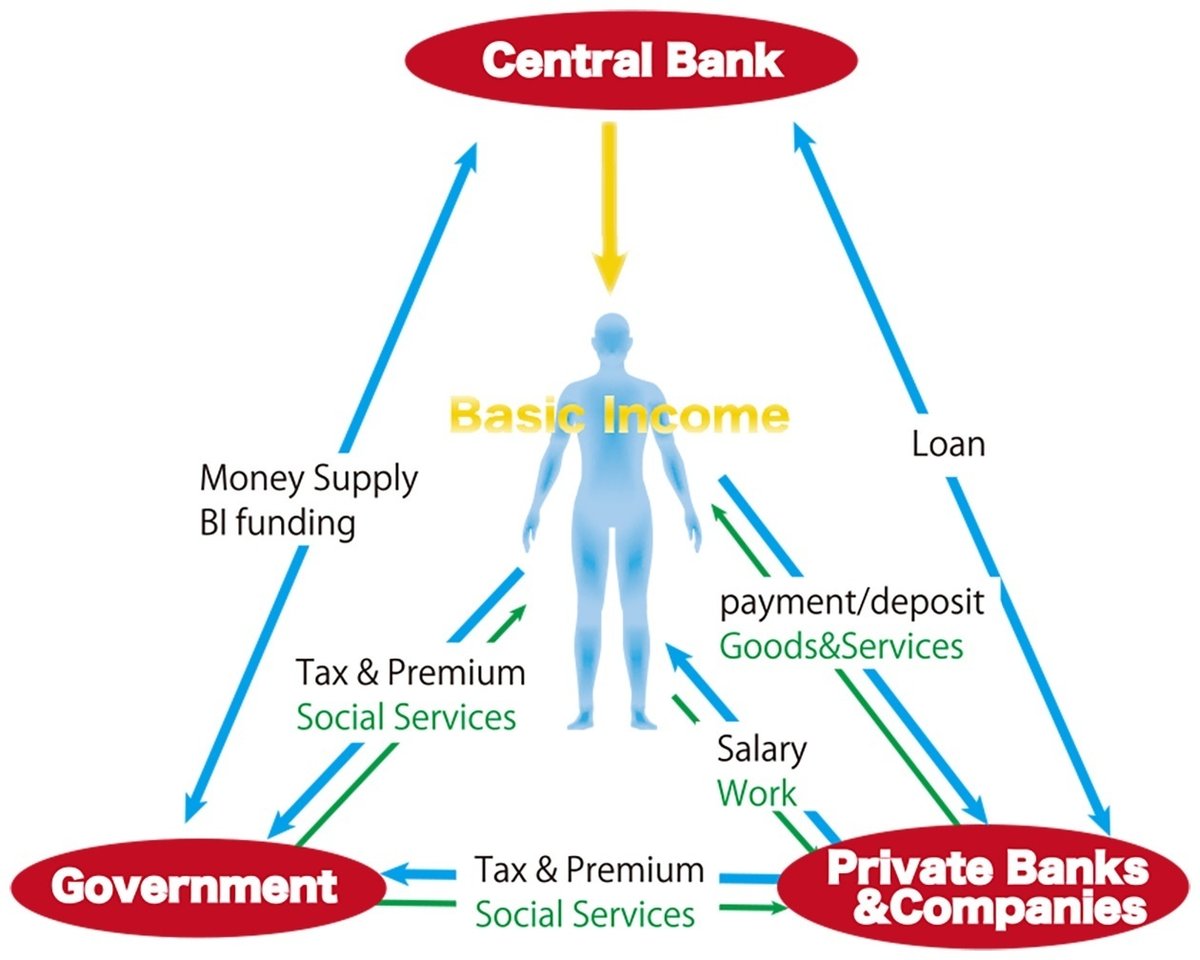
Money is a creature of law and the monetary system should be "HUMAN standard". It's time to review

マネーは法の産物、マネーシステムは「人間本位」であるべき、見直す時だ!
(日本語訳は後半)
In June 2018, a referendum on monetary reform was held in Switzerland. During the last economic crisis, Swiss citizens objected to the huge amount of public funds used to bail out financial institutions. They managed to collect 100,000 signatures and bring it to a referendum on constitutional revision. The problem, they said, is that most of the money is now being issued by commercial banks for their own profit. Few people outside the financial industry know this, but most money today is created when the bank prints the amount on the passbook when it lends someone a loan. Therefore, the financial system is always unstable. Instead, as many misunderstand, only central banks should issue money. Also, all money is created as debt, but money, printed out of nothing, need not be someone's debt. All we have to do is put it into monetary circulation appropriately. Thus, a provision was included that the money could be issued directly to governments and individuals as needed.
In response to the citizens' proposal, the Swiss government advised the public to vote against it, stating that "unprecedented experiments must not endanger Swiss society". The Swiss National Bank opposed the initiative, even breaking the unwritten rule that the central bank never speaks politically. And they declared that "the current monetary policy works very well and no problem". In the end the initiative was defeated with only 24% of the votes in favor. The same referendum now that Credit Suisse is effectively bankrupt would have had the opposite results.

As an economist GF Knapp discovered at the beginning of the 20th century, money is just a creature of the law, that is, a rule created by us. Of course, the rule has changed over time. However, we citizens had never participated in the negotiation of the monetary rules, we did not remember having agreed and, in the first place, we were not able to have an awareness of the problem because the rules themselves were not adequately documented. Economics makes no mention of the issuance of money, and it has been said by Adam Smith that money emerged naturally as a solution to the inconvenience of bartering. Just as the economy has been left to the "invisible hand", money has been presented as a natural product that is not easily controlled. But that is not true. Cultural anthropology now reveals that those who do not experience a money economy do not even barter.
Indeed, humanity's greatest problem is that money has not become a true public good. Isn't it obvious to everyone that the current financial system has a fatal flaw? The most important thing is to review the money issuance rules. Without solving this problem, our society will never be truly human.
I think it's more appropriate to run the economy by issuing money for people's lives. This will solve most of the problems of modern society. It should always be remembered that mankind already has tremendous productivity, that humans alone create demand in the economy, and that humans are valuable just by being alive.
Until recently, there was a monetary system called the "gold standard" which linked the issue of money to the gold reserves held by each country. But in human society the monetary system should be based on a 'human standard': issue the basic money needed to live, to every individual, unconditionally, universally and permanently. And, to stabilize prices, we will manage the money supply by adjusting the amount of loans to commercial banks and the amount of taxes. As Silvio Gesell once suggested, the depreciation of money just like natural assets is also a good option.


Charles Kindleberger discovered and proposed that "economic crises come in a 10-year cycle," but it will soon be 15 years since Lehman Brothers went bankrupt. Not many believe that the economic crisis is averted because the Silicon Valley Bank/Credit Suisse problem is over.The next economic crisis is not far off. Now is the time to start working to change the rules of money issuance in order to eradicate poverty, humanity's greatest challenge.

2018年6月、スイスで通貨改革に関する国民投票が行われた。前回の経済危機の際に、金融機関の救済のために巨額の公的資金が投入されたことを問題視したスイスの市民たちが立ち上がり、真に国民のためとなる通貨システムを提案、10万人の賛同署名を集めることに成功して、憲法改正の国民投票にもちこんだのだ。彼らは、何より問題なのは、今のマネーの大部分は、商業銀行が自分たちの利益のために発行していることだと言った。これは、金融業界の人以外、ほとんど誰も知らないことだが、今のマネーの大部分は、銀行が誰かに融資する時に、通帳に金額を印字する瞬間につくられる。だから金融システムは常に不安定なものとなる。そうではなく、多くの人が勘違いしているとおりに、中央銀行だけが通貨を発行するようにすべきだ。さらに、あらゆるマネーは負債としてして創造されるが、そもそも無から印字によって生まれるマネーが誰かの負債である必要はない。マネーの循環に適切に投入すればよい。だから、必要に応じて行政や個人に対してマネーを発行できるという条項も盛り込まれた。
市民の提案に対して、スイス政府は、「前例のない実験によってスイス社会を危険に陥れるべきではない」と言って、国民に反対に投票するように助言した。スイス国立銀行は、政治的な発言はしないという中央銀行の不文律を破ってまでイニシアチブに反対を表明したが、彼らは「現在の金融政策はとてもうまく機能していて問題ない」と明言した。結局、賛成票は24%にとどまってイニシアチブは否決された。「投票が予想より前倒しで実施されたのは、次の経済危機の前にやってしまわないと、結果が不都合なことになるからだろう」と関係者は話していた。そう、クレディスイスが事実上破綻した今、同じ国民投票をやったら、結果はひっくり返っていただろう。
20世紀初頭、経済学者のGFクナップが看破したように、マネーは法の産物、つまり、私達の決め事に過ぎない。もちろん、そのルールも時代とともに変わってきた。だが、私たちは、おカネのルールの取り決めに参加したこともなければ、合意した記憶もなく、そもそも、ルール自体がちゃんと明文化されていないために、問題意識をもつことができなかった。経済学は通貨発行について何も触れないし、アダム・スミス以来、通貨は、物々交換の不便さを解消するために自然に生まれたものといわれてきた。「見えざる手」に委ねられた経済と同じように、マネーは制御が簡単じゃない自然物だと刷り込まれてきた。しかし、それは真実じゃない。今では、貨幣経済を経験しない人間は、物々交換もしないことを文化人類学が明らかにしている。
実は、人類が抱える最大の問題は、マネーが真の公共財になっていないということだ。今の金融システムに致命的な欠陥があるというのは、誰の目にも明らかなことじゃないだろうか?もっとも大事なことは通貨発行のルールを見直すこと、この問題の解決なくして、私たちの社会が本当にヒューマンなものになることはないだろう。
私は、人が生きることに対して通貨を発行して、経済を運営するというのが、もっとも適切だと思う。繰り返すが、マネーは無から創造される。ユニバーサル・ベーシックインカムを税金で、誰かの負担でやる必要はない。それによって、現代社会の抱える問題のほとんどが解決可能だ。忘れてはならないことは、人類はすでに途方もない生産性を持っていること、経済において需要を生み出すのは人間だけであること、そして人間は生きているだけで価値があるということだ。
最近まで、各国が保有する金準備と貨幣の発行を結びつける「金本位制」と呼ばれる貨幣制度があったが、人間社会では、通貨システムは「人間本位」に基づいている必要がある。生活に必要な基本的なお金を、無条件に、普遍的に、永久に、すべての個人に発行する必要がある。 そして、物価を安定させるために、市中銀行への貸出額と税額を調整してマネーサプライを管理する。 かつてシルビオ・ゲゼルが言ったように、マネーを自然物と同じように減価させることも良い選択肢だ。
チャールズ・キンドルバーガーは、「経済危機がおよそ10年周期でやってくること」を発見、提唱したが、リーマン・ブラザーズが破綻してまもなく15年が経とうとしている。シリコンバレー銀行とクレディスイスの問題が終わったから、経済危機は回避されたと考えている人は多くない。
次の経済危機は遠くない。今こそ、人類最大の課題である貧困の撲滅に向かって、通貨発行のルールを変える取り組みを始める時だ。
この記事が気に入ったらサポートをしてみませんか?
